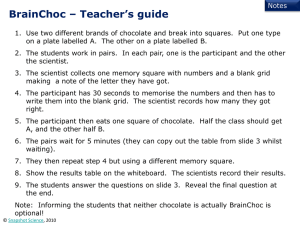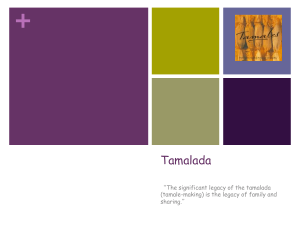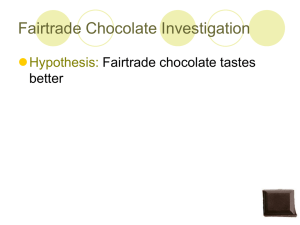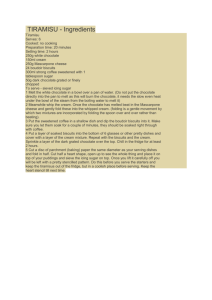Course Outline
advertisement
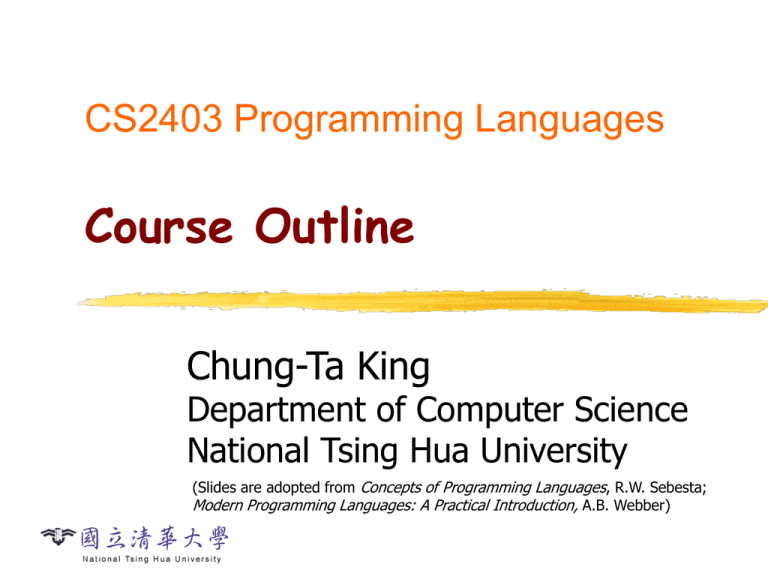
CS2403 Programming Languages Course Outline Chung-Ta King Department of Computer Science National Tsing Hua University (Slides are adopted from Concepts of Programming Languages, R.W. Sebesta; Modern Programming Languages: A Practical Introduction, A.B. Webber) On Valentine’s Day You want to impress your girl friend by baking a chocolate cake specifically for her. 1 Ask the Chef!!! 2 巧克力蛋糕食譜 材料: 1/2杯牛油 約120克黑巧克力 兩個雞蛋 兩個蛋黃 1/4杯砂糖 2茶匙中筋麵粉 步驟: 預熱烤箱到230度。 將巧克力和牛油隔水融化。 攪拌雞蛋、蛋黃和糖至到顏色變淺。 混合巧克力和牛油,倒入蛋液中,加入麵粉,攪拌至完全融合。 把攪拌物倒入模具,放入烤箱烤6~7分鐘。 把模具翻轉到盤中,靜置15秒後脫模。可配上鮮奶油。 3 Chocolate Cake Receipt Materials: 1/2 cup butter 4 ounce bittersweet chocolate 2 eggs 2 egg yolks 1/4 cup white sugar 2 teaspoons all purpose flour Step: Preheat oven to 450°F. Heat butter and chocolate until chocolate is almost melted. Beat eggs, yolks and sugar until light colored and thick. Mix chocolate and butter, and slowly pour into egg mixture, stirring constantly. Stir in flour until just combined. Pour batter into molds and bake for 6 to 7 minutes. Invert molds on plates, let sit 15 seconds, and unmold. Serve with whipped cream. 4 A Receipt Is Like a Program Receipt: 阿基師 tells you how to make a chocolate cake Has inputs (butter, eggs, chocolate, flour, sugar) & output (chocolate cake) Define a procedure Instruct how processors (oven, mixer) process inputs to generate output Can be expressed in different languages Program: You tell a computer how to do a computation Has inputs and outputs Define a procedure (algorithm) Instruct how processors process inputs to generate outputs Can be expressed in different languages 5 Questions Given two languages, how do they differ in expressing the same receipt/algorithm? Which language is better? How to evaluate “goodness” of languages? Why are there so many different languages? What is “programming language” anyway? Why does a programming language have so many different features? How are these features implemented? … Topics of this course 6 A Programming Language Is … An artificial language designed to express computations or algorithms that can be performed by a computer -- Wikipedia A language is a means of expressing your thoughts to others In the case of PL, it is a means of expressing your thoughts (algorithms) to a computer Natural languages such as Chinese and English are not used because they cannot be easily translated into machine language executable by the computer Keywords: expressiveness, implementation 7 Why PL Important? A language is a framework for problem-solving It may facilitate or hinder your thoughts and, thus, the abilities to solve problems It may help you make fewer mistakes Example: tense and gender, e.g. How to choose PL? “He was doing great!” in English Example: a C language that supports only static and global variables no malloc() How to implement hash table? linked list? (Ref.: John Mitchell, http://www.stanford.edu/class/cs242) 8 Important to Know PL by Trend (TIOBE Programming Community) 9 TIOBE 10 Important to Know PL by Trend Increasing use of type-safe languages: Java, C#, … Scripting languages for web applications with increasing client-side functionality More on expressing algorithms than syntax Runtime environment and virtualization with continuous compilation, analysis, and checking More program analysis abilities: automated error detection and recovery (Ref.: John Mitchell, http://www.stanford.edu/class/cs242) 11 Important to Know PL by Tradeoffs Factors influencing programming language Expressiveness: Application domains Programming methods: multiprogramming, interactive systems,… Implementation: efficiency Computer architecture, OS, toolchain, library Every convenience has its cost; must recognize cost of presenting an abstract view of machine Understand trade-offs in programming language design (Ref.: M. Sirjani, http://ut.ac.ir/classpages/ProgrammingLanguages) 12 PL as a Course What is not Do not teach you a programming language Do not teach you how to program What is Introduce fundamental concepts of programming languages Discuss design issues of various language constructs Examine design/implementation choices for these constructs Compare design alternatives Need to be familiar in at least one PL 13 Why Study PL? To improve your ability to develop effective algorithms and to use your language O-O features, recursion Call by value, call by reference To allow a better choice of PL Increased ability to learn new languages To make it easier to design a new language To understand significance of implementation E.g. the efficiency of a recursive function 14 Course Information 教授: 金仲達 辦公室: 資電館443 分機: 42804 email: king@cs.nthu.edu.tw 助教: 陳志中、劉正芝 上課時間: 週一13:10–15:00 週四13:10–14:00 上課地點: CSEE131 http://www.cs.nthu.edu.tw/~king/courses/cs2403.html 15 Textbook Concepts of Programming Languages, Robert W. Sebesta, 9th Edition, Addison Wesley, 2009 Describing Syntax and Semantics Names, Bindings, and Scopes Data Types Expressions and Assignment Control Structures Subprograms Abstract Data Types, Encapsulation Concurrency Exception Handling and Event Handling Functional and Logic Programming Languages 16 Expected Workload Assignments: Expect one assignment every two weeks, including programming assignments Grade breakdown Assignments Examinations Class participation 50% 45% 5% 17 Course Problems Cannot make examinations Tell us early and we will schedule makeup Cannot turn in homework on time No late homework is accepted What is cheating? Study together in groups is encouraged Work must be your own 18


